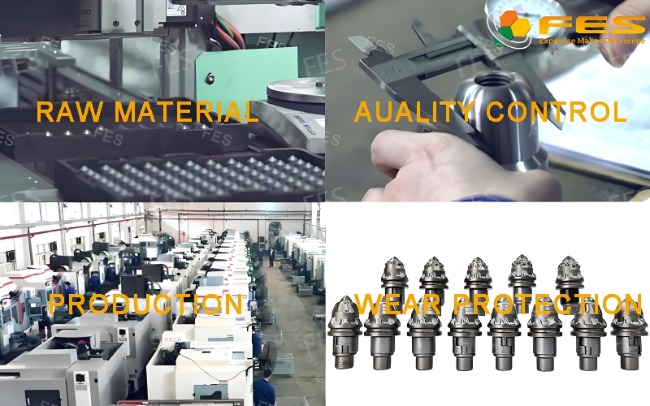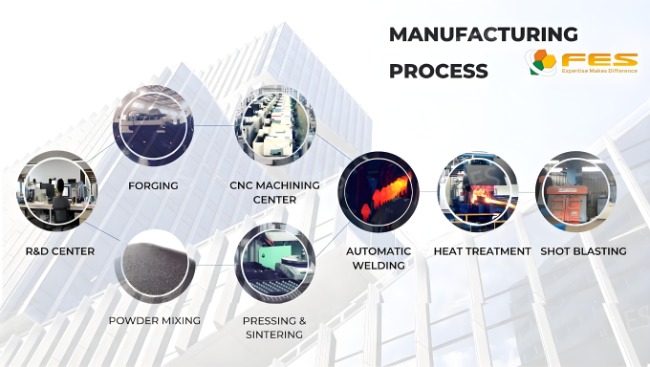What’s Bullet Teeth?
Rotary drilling teeth, also known as bullet teeth, conical teeth, or alloy teeth, are primarily used in rotary drilling rigs for pile foundation construction. These teeth are essential components for drilling operations in construction projects. They are compatible with various rotary drilling rigs from manufacturers like SANY, Zoomlion, XCMG, Foton Lovol, Caterpillar, and others.
What are the Common Types of Bullet Teeth for Auger Drills?
There are two common types of bullet teeth, BKH series and BTK series.
The BKH series, including the common B47K series, features a tail seat diameter of 30mm and tooth body diameters of 50mm or 60mm. The 50mm version typically pairs with 17.5/19/22mm hard alloy heads, though 24mm and 26mm heads are also available. This design is ideal for drilling through gravel, pebbles, float stones, and various degrees of weathered rock, with a strength range of 10-60MPa. The 60mm tooth body version is paired with a 25mm alloy head, offering greater strength for tougher materials like cobbles and metamorphic rock.
The BTK series, which is smaller in size, with a tail seat diameter of 25mm and a tooth body diameter of 33mm. This tooth matches a 9.2/12/15/16mm hard alloy head. The tooth has lower resistance at the tip, a smaller tooth pitch, and a denser configuration, offering better combination and continuity than the BKH series. It is suitable for use in mud, strongly weathered layers, and small pebble layers.
What are the Highlights of the Mostly Purchased Bullet Teeth, B47k Series in FES?
With various types of wear protection designs, FES B47k bullet teeth are much more wearable than regular ones and thus the lifetime of the teeth has been extended.
Some models are equipped with nine carbide strips, reducing direct abrasion on the steel, and are suitable for medium-hard rock (20-50MPa). Others have 24mm tungsten carbide tips with a wear-resistant coating, ideal for moderately weathered rock (30-70MPa). Some include 30mm diameter and 34mm height tungsten carbide tips with 12 carbide beads, enhancing wear resistance and drilling efficiency, making them suitable for hard rock (up to 120MPa). Additionally, some models are coated with a heavy wear-resistant layer, offering extra protection when drilling in sandy cobble strata. Other sizes and wear protection options are available for different soil and stratum conditions. For more details, refer to our YouTube channel.
To help to choose the right model, here is a selection chart for the B47K series cutter picks.
| Model | Carbide size(diameter*height) | Harness | Recommended geological condition |
| B47K17.5 | 17.5*24 | over 45MPa | Rock:Shale, marl, soft sandstone or softer formations with a certain degree of weathering. Fully weathered, weathered mudstone, sandstone, |
| 17.5*28.5 | within 50Mpa | Rock:Shale, marl, soft sandstone or softer formations with a certain degree of weathering. Fully weathered, weathered mudstone, sandstone, | |
| 17.5*28.5(LK70-H) | within 50Mpa | Rock:Shale, marl, soft sandstone or softer formations with a certain degree of weathering. Fully weathered, weathered mudstone, sandstone, | |
| B47K19H | 19*25 | within 50Mpa | Rock:Mudstone, sandstone, limestone |
| 19*29 | within60Mpa | Rock:Mudstone, sandstone, limestone | |
| 19*29(LK80-H) | within 60Mpa | Rock:Mudstone, sandstone, limestone | |
| B47K22H | 22*27 | within70MPa | Rock:Conglomerate, limestone, tuff and other harder rocks. |
| 22*30 | within 70MPa | Rock:Conglomerate, limestone, tuff and other harder rocks. | |
| 22*34 | within70MPa | Rock:Conglomerate, limestone, tuff and other harder rocks. | |
| B47K30H | 30*30 | within120MPa | Rock:Shale, marl, soft sandstone or some windy degree of softer strata. Fully weathered, weathered mudstone, sandstone, Shale, marl.Mudstone, sandstone, limestone Conglomerate, limestone, tuff and other harder rocks. |
| 30*27.5 | within120MPa | Rock:Shale, marl, soft sandstone or some windy degree of softer strata. Fully weathered, weathered mudstone, sandstone, Shale, marl.Mudstone, sandstone, limestone Conglomerate, limestone, tuff and other harder rocks. |
|
| C31HD | 12*19 | / | Rock:soft rock |
| BFZ70 | Soil | ||
| BFZ80 | Soil |
What’s the Advantages of FES Bullet Teeth?
The best quality raw material: Fes source the best quality raw material to ensure high-quality standards of our products. Our powder supplier is the same one as Betek.
Transparent and automated production process: Starting from the mixing of carbide power to the completion of the product, we monitor each process on our world-class teeth production line.
Strict quality control: We use international quality standards to measure our products. Strict quality control and inspection are carried out during different phases of the manufacturing process.
Various types of wear protection: Various types of wear protection are applied on the teeth to greatly reduce the direct abrasion on the steel, and make FES teeth more wearable than the regular ones.
How FES Tested the Bullet Teeth?
· Check and measure the sizes of teeth before testing
· Test three parts: surface hardness, core hardness and carbide hardness
· Crystal phase analysis of drilling teeth: studying and analyzing the crystal structure of the material to assess the wear resistance, strength, and overall performance of the teeth with techniques like microscopy and X-ray diffraction (XRD).
· The data will be recorded as a report by an inspector
What’s the Manufacturing Process of FES Bullet Teeth?
R&D Center: The process begins in the R&D center, where designs and innovations of bullet tooth are developed.
About Carbide Manufacture:
Powder Mixing- The appropriate metal powders, such as tungsten carbide, cobalt, and other alloy elements, are mixed to create the desired material composition for the cutting tip.
Pressing & Sintering- The mixed powder is then pressed into molds to form the basic shape of the cutting teeth. After pressing, the teeth is sintered at high temperatures in a furnace.
Forging- The sintered tooth body undergoes further shaping through high-temperature forging.
About Teeth Body Manufacture:
CNC Machining Center- Once forged, the teeth move to the CNC machining center. Here, precise machining is carried out to fine-tune the dimensions, surface finish, and other key features of the tooth.
Automatic Welding- The welding process bonds the alloy tips to the tooth body, ensuring the cutting edge is durable and capable of withstanding the abrasive forces encountered during drilling.
Heat Treatment- After machining, the teeth undergo heat treatment, which involves controlled heating and cooling to further enhance the hardness, toughness, and wear resistance of the alloy material.
Shot Blasting- Teeth are subjected to high-velocity steel shot to clean and smooth their surface.
Watch detailed manufacturing process, refer to YouTube

What are FES's production capabilities for bullet teeth?
Since 2005, FES has been providing top-quality drilling equipment and tools for global clients. FES factory has a daily production capacity of 40,000 pieces of wear teeth, with a well-established production facility that occupies a floor area of 40,000 m².
Our affiliated manufacturer operates 10 forging production lines with capacities of 2500 tons, 1600 tons, 1000 tons, 630 tons, and 400 tons. Additionally, we have dedicated lines for carbide production, a mold-making center, an automatic welding center, a CNC machining center, and an advanced product quality inspection facility.







